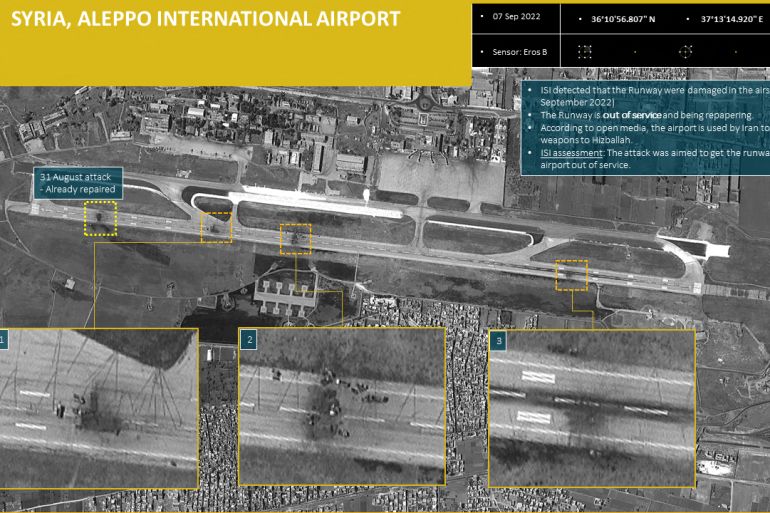Why is Israel bombing Syrian airports?
Israel has bombed Syrian airports and military positions numerous times over the course of the 11-year war in Syria.

Israel’s bombing of Syria’s Aleppo International Airport on Tuesday was the second time it had been attacked in less than a week.
The latest aerial attack – which Syria’s foreign ministry described as a “war crime” – damaged the runway, taking it out of service.
Keep reading
list of 3 itemsIsraeli air strike puts Aleppo airport out of commission: Syria
Syria says Aleppo airport hit by Israeli missile strikes
The Aleppo attacks are not the first time Israel has targeted Syria’s airports. Last June, Israeli air raids temporarily put Damascus International Airport out of commission.
Israel has also conducted numerous attacks on targets in Syria over the last few years, although few are officially acknowledged.
Let us take a closer look:
A warning to Iran
According to the UK-based Syrian Observatory for Human Rights, Israel hit a warehouse in the airport compound belonging to Iran-backed fighters, allies of Syrian President Bashar al-Assad. Three people were killed in Tuesday’s targeting of the airport, the monitor added.
Sami Hamdi, a political analyst, said the raids must be put within the context of the United States’ allies fearing Iran’s influence as President Joe Biden “steamrolls” them into pursuing a nuclear deal with Tehran.
“The attack is a warning to Iran insofar that it seeks to demonstrate that Tel Aviv will continue to resist the imposition of the new political dynamics of the nuclear deal in spite of Washington,” Hamdi told Al Jazeera.
It is also “a warning to al-Assad that there will be consequences to Syria’s infrastructure if it is used to facilitate the anticipated entrenchment of Iran’s reach that the nuclear deal is expected to bring about”, he continued.
Syrian government unable to respond
Syrian state media said the Israeli attacks on Aleppo Airport have caused material damage but did not mention any casualties. It also said that Syrian air defences had intercepted and downed some of Israel’s missiles.
And while Syria’s foreign ministry on Wednesday condemned the raids as a “war crime” and called for Israel to be held accountable, Hamdi said the government lacks any real agency to respond unilaterally due to the government’s heavy military reliance on Russia and Iran.
“Russia has no interest in any confrontation with Israel, while Iran is taking great care to avoid being provoked into an open conflict that might jeopardise Biden’s position on a nuclear deal that Tehran considers to be particularly favourable,” he said.
Instead, the Syrian government suffices with a statement of condemnation, and “a PR campaign that insists the strikes are ‘proof’ that Assad belongs to the ‘camps of resistance’ against the occupation of Palestine”, Hamdi said.
Israel sending a message to al-Assad
Since 2011, Israel has carried out hundreds of attacks on targets inside government-controlled parts of Syria in recent years but rarely acknowledges or discusses such operations.
It has, however, previously admitted to targeting bases of Iran-allied armed groups, such as Lebanon’s Hezbollah.
On Wednesday, the chairman of the Israeli parliament’s foreign affairs and defence committee, Ram Ben-Barak, told Ynet radio the strikes had been a signal to al-Assad.
“The attack meant that certain planes would not be able to land, and that a message was relayed to Assad: If planes whose purpose is to encourage terrorism land, Syria’s transport capacity will be harmed,” he said, but stopped short of saying whether Israel carried out the raid.
Iran’s role in Syria
Iran is a close ally of the al-Assad regime, and has been involved in the conflict since the outset. Iran-allied militias, most notably Lebanon’s Hezbollah group, have fought with the Syrian army against opposition armed groups.
Vladimir Sotnikov, a Russian international affairs analyst, said Iran’s position in the Syrian conflict has to do primarily with countering its archenemy Israel and its ally, the United States, as leading actors in the region.
“Geopolitically speaking, I believe that the involvement of Iran is generally explained by its intention to keep and enhance its role as a leading power in the region, fiercely competing with US ally and Syrian opposition supporter Saudi Arabia,” he told Al Jazeera.